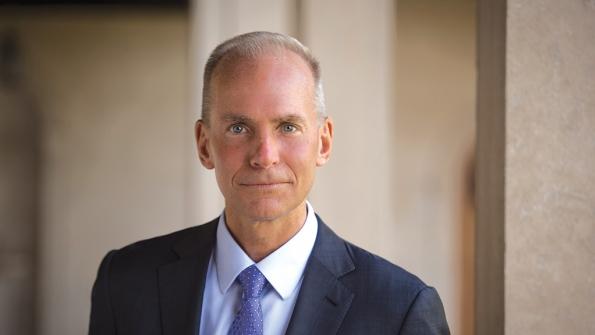Muilenburg Firing Punctuates Biggest Boeing Change In Years

Whether more management heads roll at Boeing remains to be seen now that Dennis Muilenburg has been fired as chief executive, but the era of Boeing striving gung ho to be a “global industrial champion” and putting shareholders over other priorities likely has come to an end.
Boeing announced early Dec. 23 that Muilenburg had resigned effective immediately as CEO and president, and David Calhoun—current non-executive chairman of the Boeing board of directors—will take over the roles on a permanent basis starting Jan. 13. Current CFO Greg Smith will step in as interim CEO until then.
Meanwhile, Larry Kellner, a board member and former CEO of Continental Airlines, became the new Boeing non-executive chairman, effective immediately. Calhoun has served as non-executive chairman since October, when the Boeing board suddenly stripped Muilenburg of the chairman title. Among other things, the latest announcement confirms a separation of chairman and CEO—as corporate governance advocates and some Boeing critics have called for this year.
“The board of directors decided that a change in leadership was necessary to restore confidence in the company moving forward as it works to repair relationships with regulators, customers, and all other stakeholders,” the company announced on its website.
“Under the company’s new leadership, Boeing will operate with a renewed commitment to full transparency, including effective and proactive communication with the FAA, other global regulators and its customers,” the prepared statement continued.
The FAA said in its own Dec. 23 statement that Boeing informed the agency “this morning” about Muilenburg’s departure. “The FAA continues to follow a thorough process for returning the Boeing 737 MAX to passenger service,” the agency added. “We expect that Boeing will support that process by focusing on the quality and timeliness of data submittals for FAA review, as well as being transparent in its relationship with the FAA as safety regulator.”
Boeing’s leadership change could open the door to reset its relationship with the U.S. regulator. The FAA’s new administrator, Steve Dickson, has been clear in his dissatisfaction with some of Boeing’s actions during the MAX grounding, and he called a face-to-face meeting with Muilenburg and new Boeing Commercial Airplanes President Stan Deal on Dec. 12 to express his concerns. During the meeting, Dickson called out the company’s unrealistic return-to-service (RTS) timeline that it maintained throughout the second half of 2019, even as the FAA insisted it has no defined time frame for its review. Dickson—sworn in as the top FAA official on Aug. 11, several weeks after Boeing began projecting a late 2019 RTS—also told Boeing the “quality and timeliness” of its MAX-related paperwork was lacking, according to a summary of the meeting sent to U.S. lawmakers.
Muilenburg’s ouster also comes days after Boeing announced the coming halt to production of its marquee 737 MAX narrowbody, and it follows a turbulent 2019 that saw the MAX crash for a second time, killing a total of 346 passengers and crew within five months, and numerous overly optimistic comments about fixing the MAX’s maneuvering characteristics augmentation system (MCAS) and gaining RTS.
At the same time, Boeing has suffered black eyes in defense procurement, including further challenges with delivering KC-46A tankers, as well as setbacks with NASA programs such as the CST-100 Starliner crewed capsule program, which failed to reach its destination in a test flight over the weekend. Along the way, victims’ families, lawmakers, airline customers and others have expressed anger and frustration with Boeing’s leadership.
In turn, Muilenburg’s ouster is seen as both a surprise and a fait accompli. “The Starliner was the cherry on top and people are viewing this as the bottom of the bad news,” Jefferies analyst Sheila Kahyaoglu said. “This signals [that] this is the end of it and this is the end of communicating on the return-to-service.”
Calhoun’s appointment was termed unconditional, although speculation quickly arose over whether it is the last change to hit Boeing’s top ranks. Several analysts agreed that on an immediate basis, Calhoun—a former General Electric aviation alum and current chairman of Caterpillar—has the pedigree to take over manufacturing giant Boeing. But others note Calhoun has been a Boeing director for a decade and wonder how long his tenure is. “We have mixed feelings on Boeing selecting from within and whether it will offer a fresh or new approach to the situation at hand,” Bank of America Merrill Lynch analyst Ron Epstein says.
“Some investors may have been expecting an outsider to join in some senior role if a change was made,” concurred Credit Suisse analyst Rob Spingarn.
Regardless, Boeing is almost certainly going to be a much more cautious predictor of events in the near term. “Boeing will have to make some assumption for financial reporting, when it reports fourth-quarter 2019, scheduled for Jan. 29,” Cowen analyst Cai von Rumohr noted. “Thus, our guess is that [Calhoun] will take an extra-cautious track on the impact on 737 profit accrual and possibly also on customer compensation. What’s unclear, however, is what decision he will make regarding resumption of MAX production.”
Midterm, the CEO ouster portends at least a balancing of shareholder rewards with product development, customer satisfaction and a host of other competing priorities. Muilenburg’s rise to the corner office came with an explicit goal of becoming a “global industrial champion,” a successful and sustainable business that was richly rewarding to shareholders. Boeing dividends and share repurchases rose by billions of dollars and it became a leading driver of the Dow Jones Industrial Average stock index. Along with it came a slow-rolling reduction in Boeing’s workforce, a contentious supply chain squeeze called Partnership for Success, and controversial moves such as pressing aircraft-based U.S. trade disputes with Canada and Europe.
The pushes generated many detractors. “The leadership changes announced today by Boeing are a step in the right direction,” said union leader Paul Shearon of the International Federation of Professional and Technical Engineers. “The Boeing Company has long been a world leader in both breakthrough engineering and the highest standards in aviation safety. Under Dennis Muilenburg that reputation for quality has been unquestionably tarnished.”
On Capitol Hill, critical reaction was also unsparing. “Based on what we’ve discovered so far in our investigation into the design, development and certification of the Boeing 737 MAX, it’s clear Dennis Muilenburg’s ouster was long overdue,” said House Committee on Transportation and Infrastructure Chairman Peter DeFazio (D-Ore.). “Under his watch, a long-admired company made a number of devastating decisions that suggest profit took priority over safety.”
On Wall Street, where analysts are close to the corporate CEOs and CFOs they cover, the view was only less caustic. “While Dennis is arguably not ‘to blame’ for the MAX grounding, he is responsible for what Boeing has said and done in reaction to the two tragic fatal accidents,” said analyst Rob Stallard of Vertical Research Partners. “This response has arguably come from a corporate identity that under his leadership has been less than humble. This is the Boeing that raised the 787 [production] rate to 14 a month, underbid on fixed-price development contracts in defense, and said that there would never be another aerospace downturn (etc).
“We don’t think it is controversial to suggest that Boeing’s MAX response has been a failure—and as a result we think it is wholly appropriate for the board to replace Muilenburg as the CEO of the company,” Stallard added.
Still, Muilenburg has his supporters, including within Boeing. In a message to Boeing employees upon taking over as interim CEO for the next few weeks, Smith praised Muilenburg’s work ethic. “On a personal note, I want to extend my deep gratitude to Dennis for his deep and abiding commitment to Boeing as CEO over these past four years, and for his nearly 35 years of service to the company,” the CFO said. “Dennis gave his all to the company under extraordinarily difficult circumstances.”
Smith further said he looked forward to working with Calhoun and said they had a mutual respect for each other.








Comments
It is time to completely bleach out all McDonnell-Douglas DNA from the Boeing gene-pool.
This can't happen fast enough.